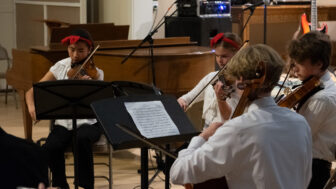
In an era where a single text has the power to make or break a relationship, technology and social media have altered the realities and expectations of dating.
Junior Kingston Ko, who is dating sophomore Soleia Sano, posts his relationship status on Facebook along with the date they started going out. Although many couples choose to feature their relationship in their profile picture, Ko chooses not to, but he still posts anniversary pictures on Instagram.
Ko says, “I like keeping people updated that we are still dating.”
Sometimes teens feel conflicted about defining and labeling relationships. Social media further complicates matters, as it expands the gray area of the status of a relationship. Sophomore Diascias Zheng, who is dating senior Arrizon Cristobal says, “For others, I do think it is sometimes difficult to define their relationship with someone because on social media you can’t tell if a person really means what they’re saying to you or if they’re just speaking in a friendly manner. It also may be a bit awkward because if you like someone that you talk to online but not so much in real life, it’s kind of hard to find a [way] into a real life interaction.”
Cristobal dislikes using social media to display his dating life, but he occasionally opens up his relationship on Facebook and Snapchat. Zheng, who uses social media more frequently than her boyfriend, says, “Whenever we go on dates in downtown, usually food related, I’ll always take his phone to take Snapchats of us and put it on his story or my story. If we happen to take a cute picture of the two of us together, we’ll probably set it as each other’s profile picture and phone background for a while … We’ve had our anniversary date set in each other’s Instagram bios for a while too.”
Contrary to Ko and Zheng, Cristobal is hesitant to use social media, as he believes that it compromises one’s privacy. Cristobal shares the same concern as many other high schoolers. A study from the Pew Research Center reveals that 69 percent of teen daters think that too many people can view what is going on in their dating life through social media.
“I don’t post anything because there are some people, relatives actually, that see if I post something,” says Cristobal.
Once when Cristobal posted a picture of himself and Zheng, it garnered some unwelcome comments from his friends in the Philippines. Cristobal says, “They may say, ‘he has a girlfriend now, and she’s not Filipina.’”
For some, social media compromises the nature of the relationship. Junior Erika Kutuzov says, “I feel like because people make their relationship more public now with social media, more is expected of them.”
Despite the judgement, Zheng enjoys posting more on social media as well as being updated about other couples. “We kind of have to censor what we put on the Internet … But we’ve learned now that people will always have opinions about you, no matter what you do. It’s how you take that opinion and if you let it bother you or not,” Zheng says.
Aside from social media platforms, text messaging has become increasingly popular in modern society. According to the Pew Research Center, 72 percent of teens who are dating text each other on a day-to-day basis while 39 percent of them talk on the phone.
As text-based communication continues to flourish, seemingly petty actions such as the response rate or length of texts may result in incorrect assumptions or anxiety. For instance, texting back too quickly may imply a sense of desperation, while taking too long to text back may make one feel ignored. Some messaging apps, which inform people the time the other person read their text, may amplify these effects.
Cristobal texts in paragraphs, while his girlfriend has a different tendency. He says, “I don’t mind [writing in paragraphs] but I feel like she does because when she wants to tell a story, she will keep texting me [in multiple texts]. For me, it’s kind of funny when she does that because my phone keeps ringing, ringing, and ringing. It’s kind of annoying but for me it’s kind of cute. If I see a long paragraph, I think she may be mad or something.”
Besides texting too quickly or in paragraphs, complexity may arise from miscommunication behind a screen. Texting may seem less authentic because it allows people to filter, as users are able to edit what they want to say.
“For texting, I also feel like you can’t show [emotion]. For example, if you say something kind, people might think wrong and take it the wrong way. Or maybe it sounds like you are getting mad if you don’t put an emoji, you know? If you don’t put that one certain thing, they think you’re serious,” Ko says.
Some believe that text-specific abbreviations remove the sincerity from a conversation. Zheng says, “The acronyms like ‘ily’ or ‘lol’ are cool, just don’t use them when we’re actually conversing about something significant, because that just makes the real meaning of the words so much less important.”
To remedy the impersonal feeling of texting, some couples use FaceTime or Skype to communicate. Kutuzov says, “I feel like when you text someone, if it’s just texting and you only see each other at school and then text when you get home, it kind of removes the emotional aspect of a relationship. FaceTiming is different because it’s kind of face-to-face, but if it’s just texting, it doesn’t seem personal or intimate.”
Additionally, video chat can help couples catch up with each other despite distance or time restraints. Zheng says, “We have different free times and different busy times, so to make up for the time we are unable to talk we can use Skype.”
Using technology for communicating or documenting relationships is ultimately an individual decision based on personal preferences. Cristobal is fond of the traditional relationship that is not affected by social media, saying, “I feel like in those times like the 80s or 90s, those kind of relationships are the real relationships, unlike today … I think in social media, you have just a connection with the person, but if you want to make a real connection, that mixes feelings and emotions, then you have to talk in real life.”




